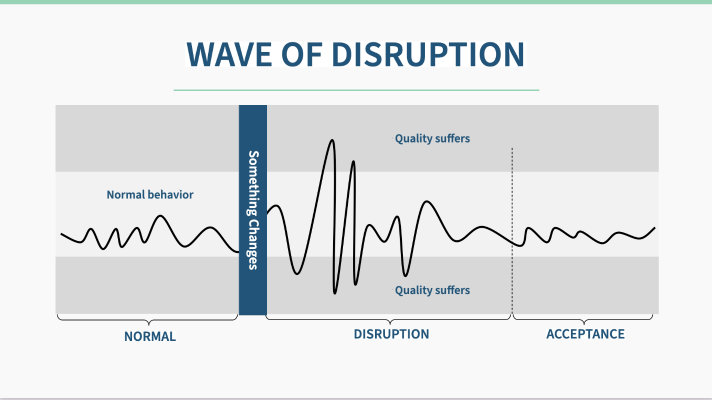Navigating the Waves of Disruption
Unexpected change is inevitably going to happen, but there are actions companies can take to prepare.
Disruptions are unavoidable. Sometimes, they may seem more frequent than we would like. If leaders work to make organizations increasingly adaptable before a crisis actually occurs, they will be better prepared.
At 18 Coffees, we see change as a core competency. The ability to handle adversity and adjust to change forces quickly and effectively allows companies to stand out from others and endure moments of turmoil. According to a Gallup article on the future of work, “If employees are accustomed to a culture of change, they are less likely to feel threatened or overwhelmed when new initiatives require them to adapt.” The embedded graph demonstrates how quality can suffer after a disruption hits, prior to moving into a period of acceptance.
Major events that happen in our society can have a massive impact on our organizations. After George Floyd was killed by a Minneapolis police officer (three other officers are currently on trial for their role) in May 2020, subsequent protests and calls for an end to systemic racism led many companies to take action. Apple announced a $100 million racial justice initiative. Bumble pledged to stand with Black communities and the Black Lives Matter movement while donating more than $1 million to organizations, including the NAACP Legal Defense and Education Fund and the Southern Poverty Law Center. Other companies posted messages of “Black Lives Matter” in a gesture of solidarity.
Not everyone was impressed by the monetary donations or words of support, especially when they weren’t accompanied by internal changes. In an attempt to create transparency and hold companies responsible for their internal structures, the “Pull Up or Shut Up” campaign was launched in June of 2020 by beauty executive Sharon Chuter. It called on companies to release the number of Black employees they had at the corporate and executive levels. Within the first three days, some companies, including Sephora, Ulta, and Kylie Cosmetics, did reveal their numbers.
Some companies were caught off guard by these campaigns and the larger cries for racial equality. Organizations that want to be equipped to meet these moments should have:
strong communication practices, which allow leaders to effectively share information internally and with external stakeholders while providing opportunities for ownership
leaders that focus on empathy, which helps boost collaboration and cooperation
adaptive cultures, which embrace collective efforts and creative solutions
By focusing on these behaviors and values, companies will be better prepared to endure the wave and move into the period of acceptance.

